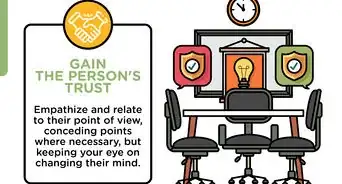This article was co-authored by Guy Reichard. Guy Reichard is an Executive Life Coach and the Founder of HeartRich Coaching & Training, a professional life coaching and inner leadership training provider based in Toronto, Ontario, Canada. He works with people to create more meaning, purpose, well-being, and fulfillment in their lives. Guy has over 10 years of personal growth coaching and resilience training experience, helping clients enhance and transform their inner worlds, so they can be a more positive and powerful influence on those they love and lead. He is an Adler Certified Professional Coach (ACPC), and is accredited by the International Coach Federation. He earned a BA in Psychology from York University in 1997 and a Master of Business Administration (MBA) from York University in 2000.
There are 8 references cited in this article, which can be found at the bottom of the page.
wikiHow marks an article as reader-approved once it receives enough positive feedback. In this case, 88% of readers who voted found the article helpful, earning it our reader-approved status.
This article has been viewed 192,513 times.
Powerful people are put into positions of power by other people, but that doesn't mean they stay inactive during the whole process. To become powerful, you'll need to demonstrate the characteristics and actions common to people who possess authority and influence. You may need to win over friends in order to influence people.
Steps
Building a Powerful Person
-
1Find the right role. Becoming powerful will come more naturally if you put yourself into a position that also feels natural. Find something you feel comfortable doing, then insert yourself into the middle of the field and work your way to power from there.[1]
- In particular, you should try putting yourself into leadership roles that you feel comfortable maintaining, even if those roles aren't directly related to the field you want to become powerful in. For instance, you might lead a small group at your church even though you want to become powerful at the office.
- By putting yourself into positions of authority, you can develop a more powerful personality. That personality can then carry over into other areas of your life.
-
2Meditate on past sources of power. You've probably experienced moments of power in your past, even if they seem minor when compared to the sort of power you're seeking now. When you feel your resolve starting to shake, recall these past moments and spend some time meditating on the sensation of power they once evoked.[2]
- The moments you recall can deal with virtually any aspect of life. For example, you might choose a notable academic accomplishment, like graduating with honors, or even a personal one, like successfully quitting smoking. Regardless of what you choose, the point is to focus on the sensation of being powerful rather than on the actual event itself.
Advertisement -
3Adopt a powerful posture. While it isn't always true, powerful people tend to use expansive body language that takes up more space. This sort of body language can convey confidence to other people, which may make them view you as a more powerful person.[3]
- Expansive body language can include crossing your arms, crossing your legs so that the knee sticks out, stretching out your legs so that they extend beyond the edge of the chair, or holding your hands to your hips.
- In contrast, you demonstrate constricted posture when you do things like folding your legs beneath your chair, dropping your shoulders, or holding your hands to your sides.
-
4Act powerful before becoming powerful. Doing so will require you to demonstrate fearlessness and a considerable amount of self-confidence. If you're waiting until you have the power to back your claims, you'll probably be waiting indefinitely.[4]
- Don't be afraid of making changes or taking risks, and even if you are afraid, you should act as though you aren't. Power works in a cycle. When others view you as being powerful, they will naturally treat you like you're a powerful person, even to the extent of granting you power you didn't have before.
-
5Stay true to your own vision. Know what you want and go after it, regardless of whether others agree or not. To the same end, never pursue a course of action simply because it's the popular thing to do.
- When pursuing your own path, don't constantly broadcast it. Doing so makes it appear as though you're seeking approval, which puts you in a less powerful position than the others you seek it from.
-
6Break a few rules. Don't be afraid to think outside the box and break a few minor rules or social conventions. Innovation often requires a leap of faith. Moreover, tactfully violating a minor convention can also suggest to others that you are a powerful enough person to get away with doing so.[5]
- The key is understanding which rules need to be kept and which can be broken. There is no single way to define which is which since each set of circumstances can vary drastically, but as a general rule, only break a rule that needs to be broken. Look for areas that could be improved upon if the current rules were stretched a bit and see what you can do to break free of unnecessary restrictions.
-
7Shoulder responsibility. When things go wrong, don't point fingers or spend time dwelling on the mistakes that were made in the past. Instead, accept responsibility for correcting the mistake in the present, and make the most out of a bad situation.[6]
- Failure is a part of everyone's life story, and powerful people aren't afraid of admitting to that. The key is accepting it and proactively working to correct it. Instead of discussing who has the most fault in a situation, you can demonstrate more power by replying with a simple, "I'll take care of this."
-
8Pay attention to your own well-being. This includes both your physical and mental well-being. If you're not at your best, you won't give off a very powerful presence.
- Taking care of your physical health is a straightforward matter. Eat well, exercise enough to stay in shape, and get the sleep your body needs to function.
- Taking care of your mental and emotional health can be trickier, but in general, you should take time to relax and reconnect with the people and things that are important to you. Don't get so caught up in chasing power that you let the quest consume you.
Utilizing Powerful Social Skills
-
1Set expectations. Instead of waiting for others to make decisions, make those decisions yourself. Toss aside your hesitation and be straightforward about your demands and desires, thereby setting the pace of each interaction.[7]
- Instead of asking permission to do something, state your plans without asking for confirmation. Even if things would end up the same way regardless of whether you made the first move, stating your expectations first will allow you to claim the more powerful position in the interaction.
-
2Treat people with professional courtesy. To demand respect, you need to be willing to give it. The other party's time is just as valuable as yours, and you need to demonstrate your understanding of that key fact.
- Stick to the golden rule: treat others as you would like to be treated. You wouldn't like it if someone was running late to a meeting and didn't warn you in advance, nor would you like it if you did someone a favor and he or she didn't offer so much as a single “thank you.” If someone who demonstrates this sort of behavior would lose your confidence, you'll probably lose someone else's confidence if you act like this.
-
3Keep people informed. Good communication is absolutely essential if you want to become powerful. Don't put people in the position of having to guess or worry about what will happen. Instead, provide them with all the details you would want to know if your positions were reversed.[8]
- For instance, if you're researching something for someone and have told him or her that you expect to have an answer by Tuesday afternoon, you need to contact that person by or before Tuesday afternoon. Even if you don't have the answer, you need to drop that person a line and let him or her know that you haven't forgotten and still intend to follow through.
-
4Be clear. Good communication leaves little room for error or misunderstanding. When you explain something, do so in the least confusing way possible. Make sure that all of the important details are ironed out before dropping the matter.[9]
- Detailed communication is important if you want to avoid later mishaps and meltdowns. Everyone needs to be on the same page. Even if things go wrong, previously maintaining clear communication will reduce the amount of finger-pointing that results from the misfortune since no one can claim that they simply “didn't know.”
- In business, in particular, you should also communicate in writing as often as possible so that the details can be readily referenced and reviewed later on.
-
5Anticipate needs and demands. Try not to wait for someone to ask before completing tasks or favors. If you can anticipate an upcoming need before it becomes urgent, you will demonstrate a high degree of capability.
- Of course, there are times when you will need to wait for instructions before acting. If you have a new job, for example, it'll take time before you know everything well enough to act on your own.
- The main thing you need to avoid is forcing people to ask you for something repetitively. No matter how well you complete the task, the person receiving the results will probably feel frustrated if he or she needed to remind you multiple times.
-
6Engage yourself. Looking busy and distracted won't make you look as powerful as you might think, so don't be distracted when you're talking with someone. Make sure that each person you talk with has your complete and undivided attention.
- In particular, you should stop obsessing over texts, calls, and e-mails at the expense of the people in front of you. Technology can keep you in constant contact with others, and that's a good thing, but you can't rely on it.
- You need to react to the whole being—mentally and emotionally—when dealing with others, and that requires attention and authenticity.
-
7Work well with others. If people dread the thought of working with you, they'll likely reject the notion of working for you. Learn to accept ideas from other people and let yourself learn from them. When conflict comes up, handle it fairly instead of lashing out in a petty fashion.
- Instead of fixating on others' faults, help them work through it. Similarly, when someone points out your own faults, accept the criticism graciously and learn to improve from it.
-
8Network effectively. Even though you should have a positive reputation with everyone who crosses your path, you should pay special attention to the relationships you have with people already in positions of power.
- In fact, you should actively seek people in positions of power. Making connections with the right people will make it easier to put yourself on the right path.
-
9Show anger when appropriate. Conflict is inevitable, so there's not real point in running away from it. Handle things as rationally and calmly as possible, but don't be afraid of expressing anger, either. In terms of power, anger is at least better than regret or sadness.
- There is always a place for forgiveness and understanding. That being said, people generally won't seek forgiveness if you're too busy doing the apologizing and regretting for them. Allowing yourself to express anger doesn't mean you need to be merciless, but it does mean you'll need to demonstrate that you can't be pushed around.
-
10Don't be afraid of making enemies. You really should try to get along with most people, but at the same time, you can't please everyone. Don't be afraid of going against the grain and getting on someone's bad side. If you're always tailoring yourself to fit someone else's expectations, you'll never gain any power or standing for yourself.
- In general, being straightforward without pulling any punches will rub some people the wrong way, but you can't let that knowledge stop you from acting how you need to act. Be tactful, open-minded, and willing to compromise as needed. When push comes to shove, though, don't be afraid of stepping on some toes to get things done the right way.
Expert Q&A
-
QuestionHow can I be a more powerful leader?
 Guy ReichardGuy Reichard is an Executive Life Coach and the Founder of HeartRich Coaching & Training, a professional life coaching and inner leadership training provider based in Toronto, Ontario, Canada. He works with people to create more meaning, purpose, well-being, and fulfillment in their lives. Guy has over 10 years of personal growth coaching and resilience training experience, helping clients enhance and transform their inner worlds, so they can be a more positive and powerful influence on those they love and lead. He is an Adler Certified Professional Coach (ACPC), and is accredited by the International Coach Federation. He earned a BA in Psychology from York University in 1997 and a Master of Business Administration (MBA) from York University in 2000.
Guy ReichardGuy Reichard is an Executive Life Coach and the Founder of HeartRich Coaching & Training, a professional life coaching and inner leadership training provider based in Toronto, Ontario, Canada. He works with people to create more meaning, purpose, well-being, and fulfillment in their lives. Guy has over 10 years of personal growth coaching and resilience training experience, helping clients enhance and transform their inner worlds, so they can be a more positive and powerful influence on those they love and lead. He is an Adler Certified Professional Coach (ACPC), and is accredited by the International Coach Federation. He earned a BA in Psychology from York University in 1997 and a Master of Business Administration (MBA) from York University in 2000.
Executive Life Coach You lead with all your heart, with deep love, care, compassion, honesty, courage and bravery. Nothing could be more powerful but this is no easy feat as it takes a lot of personal work to overcome fear and ego, which blocks and prevents most people from living and leading from the heart.
You lead with all your heart, with deep love, care, compassion, honesty, courage and bravery. Nothing could be more powerful but this is no easy feat as it takes a lot of personal work to overcome fear and ego, which blocks and prevents most people from living and leading from the heart.
References
- ↑ https://www.fredonia.edu/student-life/career-development-office/c-c1
- ↑ https://books.google.com.ph/books?hl=en&lr=&id=pWH6DwAAQBAJ&oi=fnd&pg=PR11&dq=manifesting+power+by+meditating&ots=5fUXbKmUEk&sig=ntQ6kNKfhwlWYi6XsC7Yf3FMHSA&redir_esc=y#v=onepage&q=manifesting%20power%20by%20meditating&f=false
- ↑ https://www.sciencedaily.com/releases/2009/10/091005111627.htm
- ↑ https://fbaum.unc.edu/teaching/articles/Dahl_Power_1957.pdf
- ↑ https://www.sciencedaily.com/releases/2011/05/110520092735.htm
- ↑ https://pubmed.ncbi.nlm.nih.gov/31349199/
- ↑ https://ethicalleadership.nd.edu/news/four-ways-to-use-your-power-ethically/
- ↑ https://hbr.org/1995/09/the-power-of-talk-who-gets-heard-and-why
- ↑ https://hbr.org/1995/09/the-power-of-talk-who-gets-heard-and-why
About This Article
To become a powerful person, aim for leadership roles that showcase your confidence, which will make people feel comfortable giving you power. If you need help building confidence, practice actively engaging with people by giving them your full attention, and don’t get distracted by phone calls or texts with speaking with someone. To stay on an upward path professionally, network effectively by seeking out and connecting with people already in positions of power and work to build relationships with them. For more info on how to become powerful, like why you shouldn’t be afraid to make enemies, keep reading!
















































































